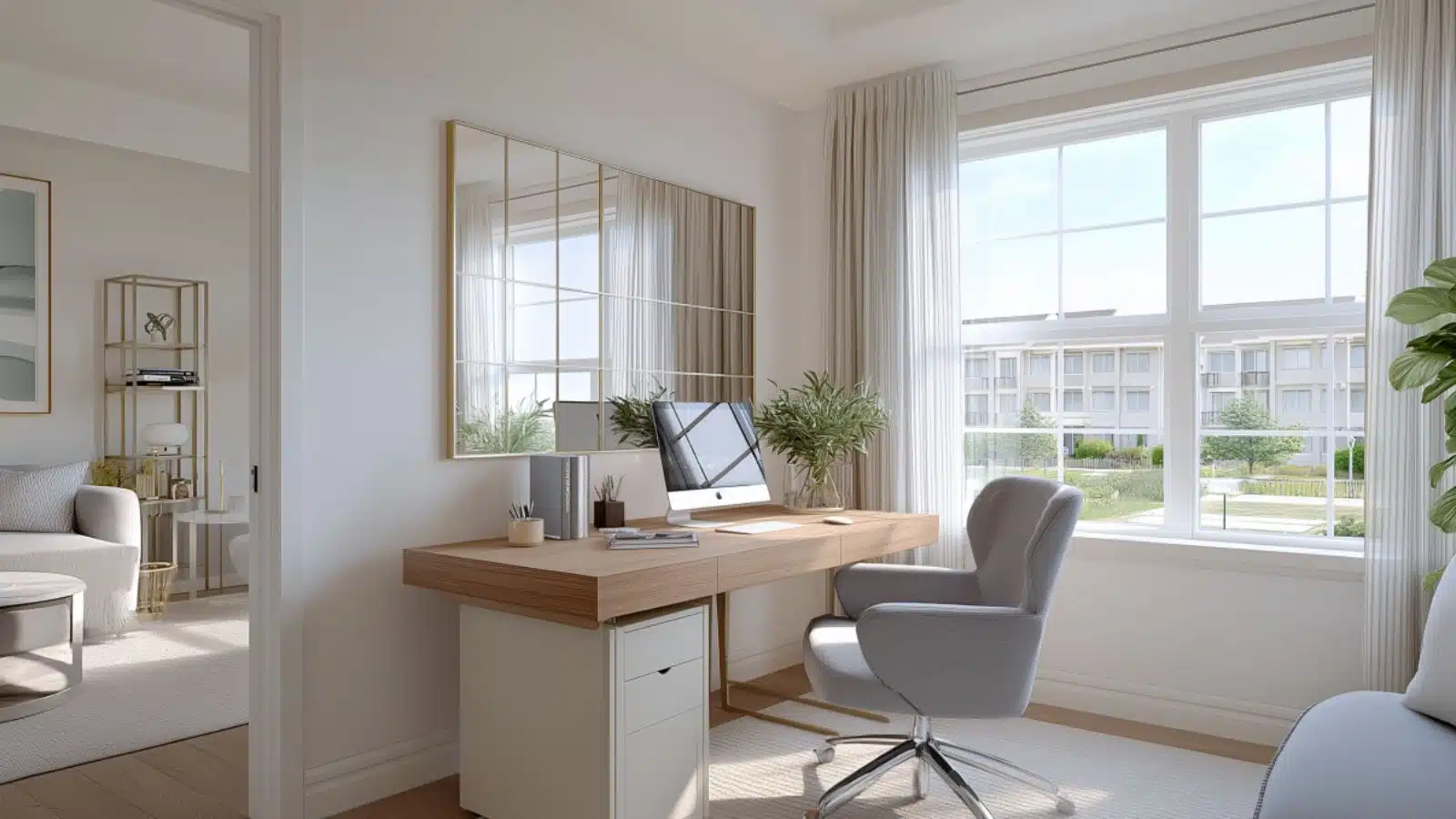Unlock Your Best Workday with These Inspiring Home Office Ideas
Table of Contents
Do you ever feel like your home workspace saps creativity or energy? You’re not alone. Studies show that a well-designed home office can increase productivity by up to 20% and reduce stress levels significantly. When your environment invites inspiration, your workday transforms from mundane to motivating.
A thoughtfully designed home office doesn’t require a complete renovation. Often, it’s the small additions—an accent wall, natural light, or ergonomic chair—that unlock your best workday. With remote work here to stay, creating an office that supports your focus, comfort, and creativity is no longer a luxury—it’s essential.
In this blog post, we’ll explore a variety of inspiring office ideas designed to elevate your daily routine. From maximizing natural light and integrating greenery to blending storage with display and selecting ergonomic furniture, this guide covers practical tips and stylish solutions. You’ll also discover how to personalize your space, define work zones, and nurture a productive mindset. Whether you’re looking to overhaul your workspace or just refresh it, these ideas will help you unlock greater efficiency, wellness, and joy in your home office.
Harnessing Natural Light to Elevate Productivity
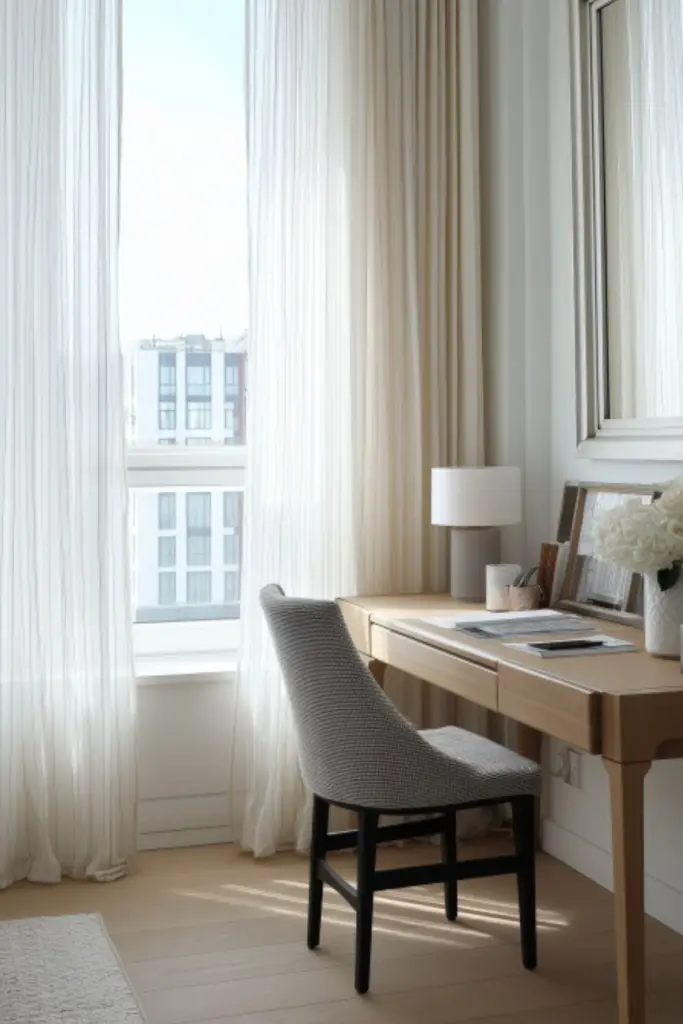
Natural light isn’t just pleasant—it’s a powerful productivity enhancer. Studies show exposure to natural light improves mood, alertness, and overall performance. Position your desk near a window to maximize daylight, taking full advantage of your home’s natural assets.
If your space lacks direct light, consider mirror placement or light-colored surfaces to bounce brightness around. Sheer curtains offer privacy without blocking sunlight. Task lighting like adjustable desk lamps complements natural illumination early morning or late afternoon. Aim for at least 300–500 lux at your workspace for optimal clarity.
Balancing light reduces eye strain and adds warmth to the room. A well-lit office feels inviting, energizing, and efficient—a perfect start to an inspiring workday.
Table: Natural Light Enhancements
| Strategy | Benefit | Ideal Placement |
|---|---|---|
| Desk by Window | Boosts mood, reduces fatigue | Facing or beside windows |
| Light-Reflecting Surfaces | Maximizes existing daylight | White walls, mirrored accents |
| Sheer Window Coverings | Maintains daylight with privacy | Front-facing or side windows |
| Adjustable Desk Lamp | Adds focused light for tasks | On desk or mounted overhead |
Selecting Ergonomic Furniture for Comfort and Health
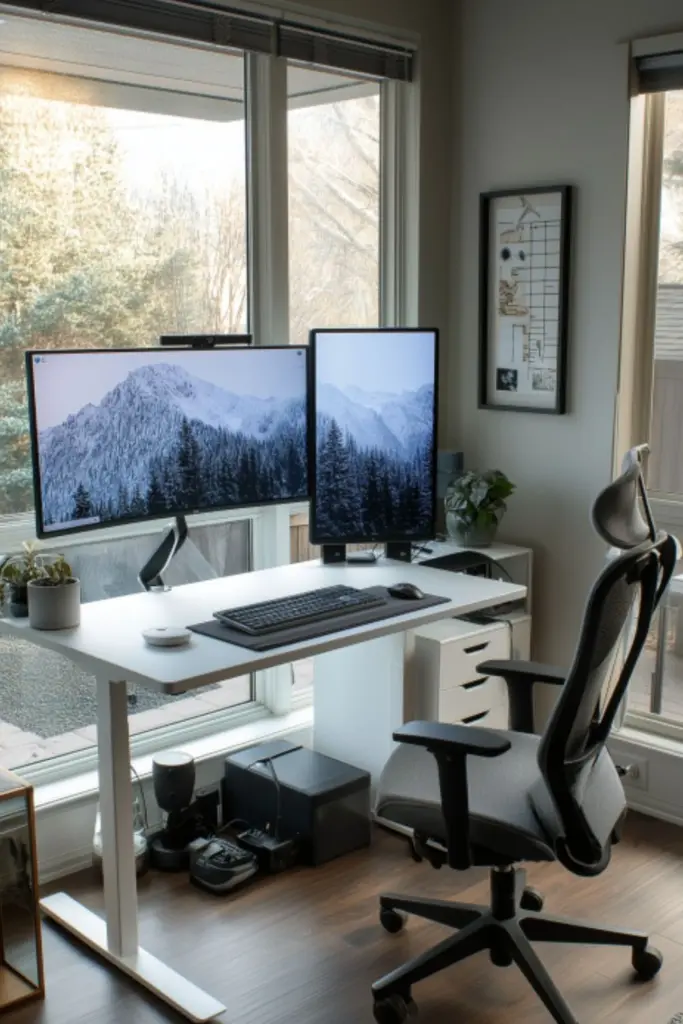
A great workday starts with comfort. Ergonomically designed furniture supports posture, reduces fatigue, and improves productivity. A height-adjustable desk lets you alternate between sitting and standing. Choose an office chair that offers lumbar support, seat depth adjustment, and armrests that sit at your desk height.
Monitor placement is critical—top of screen at or slightly below eye level, about arm’s length away. Footrests, wrist pads, and keyboard trays further reduce strain. Even small tweaks, like raising paperwork to eye height with a stand, help maintain alignment.
Comfortable ergonomics means fewer breaks for aches and more focus on meaningful work. When your body feels supported, your mind can concentrate on creativity and problem-solving.
Table: Ergonomic Home Office Essentials
| Furniture Piece | Benefit | Ergonomic Feature |
|---|---|---|
| Adjustable Standing Desk | Supports movement and posture | Height range 24–50″ for sit/stand |
| Ergonomic Office Chair | Prevents back and neck pain | Adjustable lumbar and armrests |
| Monitor Stand | Reduces neck strain | Raises screen to eye level |
| Keyboard Tray | Promotes neutral wrist position | Adjustable tilt and height |
| Footrest | Alleviates lower-back pressure | Cushioned and angled |
Incorporating Storage and Display for Smart Organization
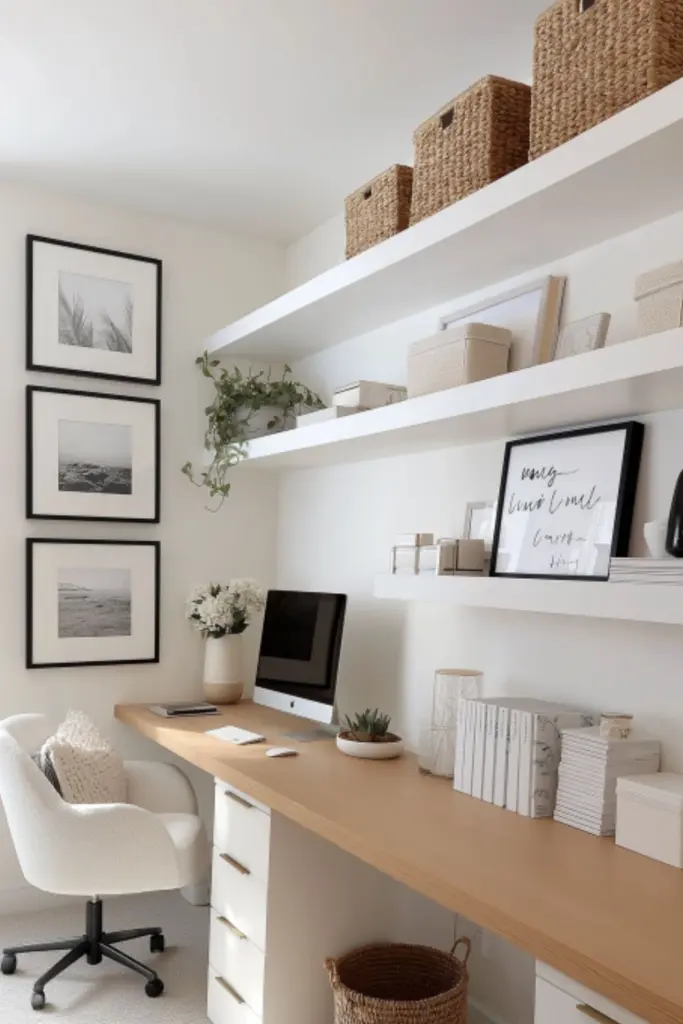
Clutter disrupts focus. Integrating storage that works with your decor is essential for an organized workspace. Floating shelves above or beside your desk offer display space without taking floor real estate. Closed cabinets or modular cubes keep paperwork, electronics, and supplies out of sight.
Use bins, baskets, or boxes with labels to categorize items. Add vertical file holders or wall-mounted rails for current project files. To personalize, leave room for decor—photos, books, or mementos help balance function with inspiration. The goal is a space that feels lived-in yet ordered, where everything has a place and creativity can flow.
Table: Clever Storage Solutions
| Storage Solution | Function | Design Tip |
|---|---|---|
| Floating Shelves | Display and vertical storage | Vary scale; mix bins and decor |
| Modular Cubes | Stackable flexible storage | Use neutral tones for cohesive look |
| Wall-Mounted File Rails | Organize active projects | Label each slot by subject |
| Lidded Baskets | Hide small supplies | Keep textures earthy and calm |
| Desktop Organizer Tray | Contain pens, notes | Select sleek, minimalist design |
Zoning Your Space to Separate Work and Rest
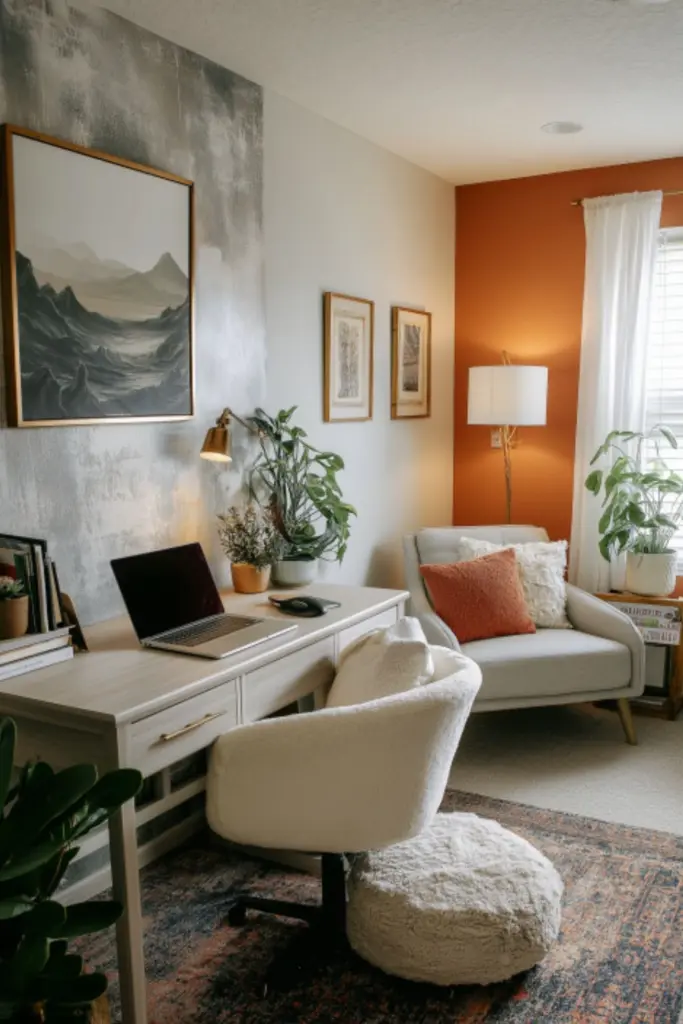
Blurring the line between work and personal life can erode both productivity and relaxation. Delineating zones in your home office—especially if part of a bedroom or shared area—helps set mental boundaries. Use rugs to visually anchor the desk zone, and distinct lighting fixtures—a desk lamp here, ambient light there—to signal different activities.
Furniture placement plays a big role. Orient your desk away from areas associated with relaxation. Consider room dividers or shelving units as subtle separators. Even a different paint color or wallpapered accent wall behind the desk creates emotional separation between work and leisure. These cues help shift mindset during your workday and evening hours.
Table: Visual Zoning Techniques
| Zoning Method | Effect | Best Use Case |
|---|---|---|
| Area Rugs | Defines separate zones visually | Under desk versus under lounge chair |
| Lighting Layers | Gives functional cues and mood control | Desk lamp vs. floor lamp |
| Partition Furniture | Creates spatial division | Bookshelf or console as room divider |
| Accent Wall | Visually differentiates work area | Behind desk featuring color or pattern |
| Desk Orientation | Directs attention flow | Faces away from relaxation zones |
Personalizing Decor to Inspire Creativity
A functional workspace becomes a source of inspiration when it’s infused with personal touches. Select a color palette that energizes—soft blues for calm focus, terracotta for warmth, sage green for balance. Add meaningful décor: purpose-driven art, vision boards, or motivational print quotes.
Bring in well-placed plants for their natural form and air-purifying qualities. Choose pieces that reflect your style—sculptural vase with botanicals, ceramic dish with paperclips, or a handcrafted mug for your pens. These small details resonate emotionally, encouraging creativity and making the office feel truly yours.
Table: Personalization Elements
| Decor Element | Inspiration Benefit | Placement Example |
|---|---|---|
| Framed Art or Quotes | Boosts mood and motivation | Above desk or on shelf |
| Greenery (Plants) | Adds life and fresh air | Desk corner or window ledge |
| Personalized Mug or Dish | Combines utility with identity | Holds pens or leave trinkets |
| Statement Rug | Adds warmth and style | Under desk or entry of office |
| Handmade Craft | Reflects creativity and authenticity | On shelf or desktop surface |
Enhanced Lighting Strategy for Balanced Ambience
Lighting transforms a workspace. Layering ambient, task, and accent lighting ensures you can work effectively while also creating an inviting atmosphere. Begin with an overhead fixture—modern pendant or recessed lights. Add adjustable desk lamp for task brightness and avoid eye strain.
Consider accent lighting for shelves or artwork, and choose bulbs with color temperatures between 2700–3000K for a warm, welcoming tone. For rooms with changing functions, install dimmer switches so light intensity matches activity—bright for work, softer for unwinding.
Electric outlets near your desk and lighting zones allow flexibility for charging and accessories without cable chaos. Thoughtful lighting design enhances productivity and comfort throughout the day.
Table: Lighting Layers Explained
| Lighting Layer | Purpose | Design Example |
|---|---|---|
| Ambient (Overhead) | Overall room illumination | Pendant light or flush mount |
| Task (Desk Lamp) | Focused work lighting | Adjustable arm or LED lamp |
| Accent (Shelf/Art) | Adds depth and visual interest | Under-shelf LEDs or picture lights |
| Mood (Corner/Floor Lamp) | Sets relaxed tone | Soft-glow lamp for relaxation |
| Adjustable Dimmer | Control light intensity | Compatible with all light sources |
Conclusion
Unlocking your best workday starts with a space that supports focus, creativity, and well-being. With these inspiring home office ideas—maximizing natural light, optimizing ergonomics, organizing smartly, zoning thoughtfully, and personalizing intentionally—you can transform any room into a productive retreat.
The small upgrades, from a well-placed plant to layered lighting, add meaningful impact over time. Most importantly, by aligning design with your personal needs and style, you’ll create a workspace that isn’t just where you work—it’s where you thrive.

